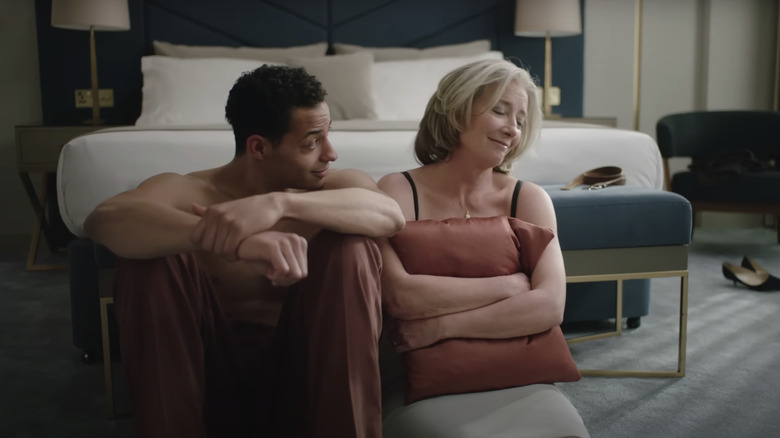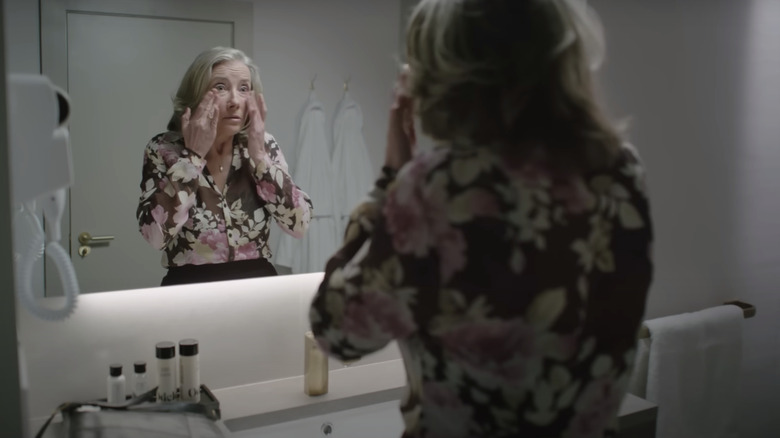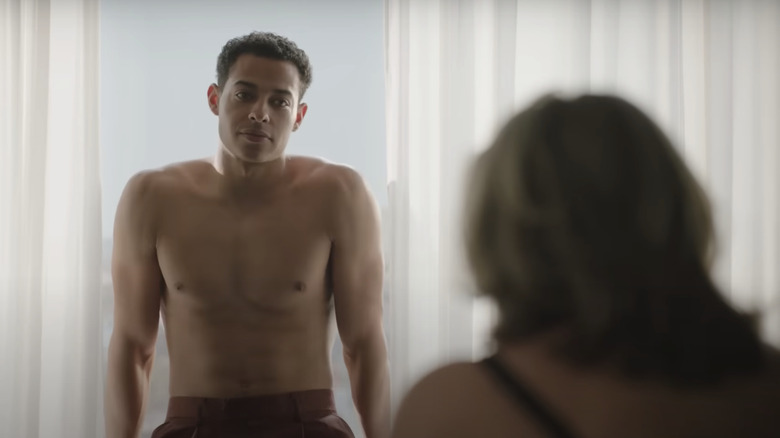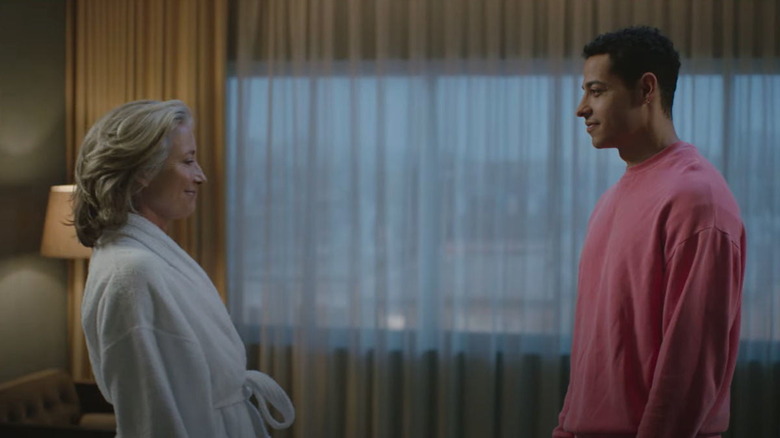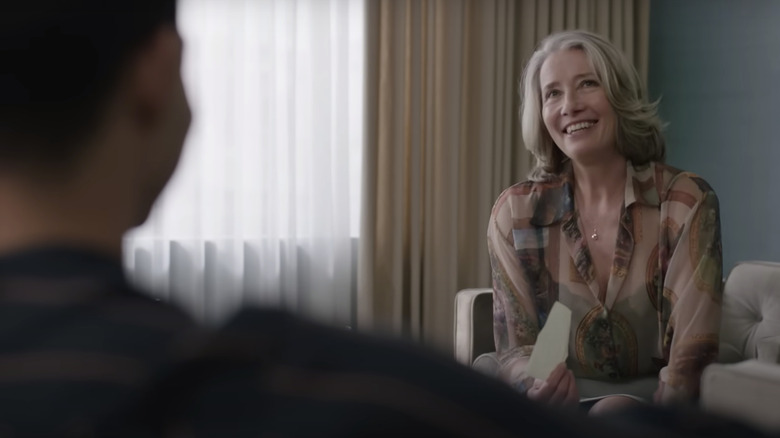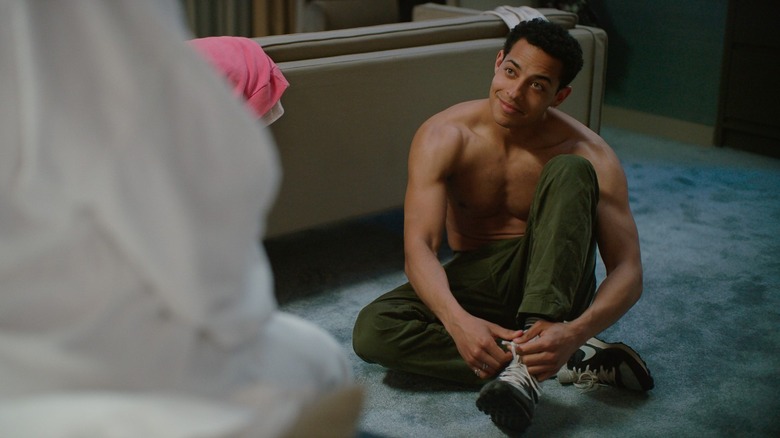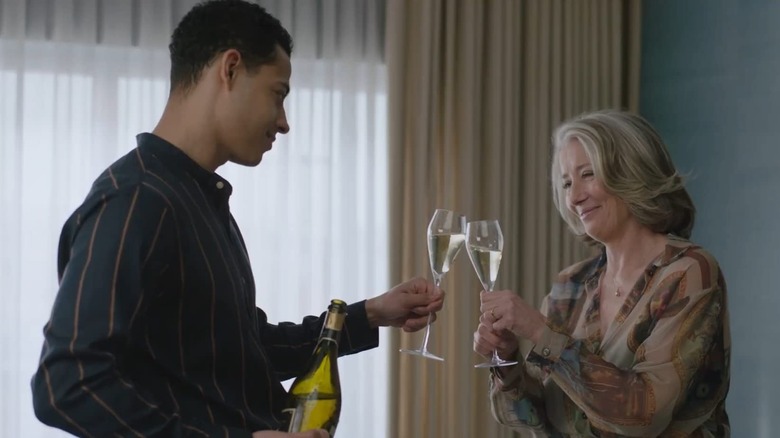Good Luck To You, Leo Grande Writer On Normalizing Sex Work And The Importance Of Shared Laughter [Interview]
In the new Hulu film "Good Luck to You, Leo Grande," writer Katy Brand brilliantly tells a tale about an aging woman named Nancy (Emma Thompson) who, after the death of her husband, takes control of her own pleasure for the first time in her life by pursuing the company of a young, full-service sex worker by the name of Leo Grande (Daryl McCormack). In a script penned by a lesser writer, "Good Luck to You, Leo Grande" could have easily fallen into a familiar humiliating sex-negative trap in which someone would have had the audacity to mock the desires of a character played by international treasure Emma Thompson.
Fortunately, this is a movie written by Katy Brand, a remarkable voice with a deeply empathetic sense of humor who has crafted a remarkably tender and sex-positive look at the ways in which women embrace their sexual autonomy, regardless of age. The film is almost entirely focused on just Nancy and Leo, making the audience feel as if we're bearing witness to the duo in real time. We were fortunate to have the opportunity to talk to Brand, who is as insightful and clever as her scripts would lead you to believe.
'It's like a fear of what you want'
This story brings to light such an important conversation regarding pleasure and aging. So I was curious if there was anything specific that lit that inspirational spark to bring the story to life for you?
It was an idea that I'd had for a long time to try and talk about some of those issues, although the actual image that I had in my head was the opening scene that I found very compelling and interesting: The scene of Nancy waiting in the hotel room, having booked this young guy. He's about to arrive and she's nervous. So I had that very powerful scene and her nervous energy about it, having done this thing that she really wanted to do, now it's about to actually happen, and she's just suddenly just terrified. And that is something that's interested me, I think, that it seemed like a good place to start this idea. And Leo even says to Nancy, I think, at one point, "Why won't you take what you want when it's right here in front of you?" It's like a fear of what you want, a fear of satisfying your own pleasure, and guilt and shame around taking sometimes rather than giving all the time.
That spoke to me about particular sorts of people, but also what is often put on women that they have to take care of everyone else first and then think of themselves last. And I think some women throw that off as they get older and are quite bold about doing that. And I think that's brilliant. But many women don't. They push further and further and further away until I think they lose touch with what they really want. And so that was a subject that I wanted to explore as somebody who's getting older myself and wants to take charge of my own pleasure and happiness as much as anyone else.
'People like Leo really do exist in the world'
I was captivated by the entire world that you've built. And I also love the fact that this is a story about a woman pursuing sex work, because I think we can both agree that sex work is highly stigmatized in a lot of cultures, especially for women clients. I was curious if you could speak on that at all?
I think particularly in the UK and the U.S. it's a huge debate that is still quite contentious, but there are many countries in Europe, for example, where sex work is completely legal. I spend a lot of time in Germany and it's totally legal. And there was a huge article in one of the most prestigious national newspapers about six months ago, an interview with a sex worker just like Leo talking in the way that Leo does about how much he loves his work. None of it was anonymized. He had a full picture of himself with his name and they interviewed a few of his clients, some of which were older women like Nancy. They used their own names and they all talk very openly about how happy they were with the arrangement and so on. Although I know that in some countries it is still stigmatized and talked about in quite contentious terms, I was also mindful that I'm often in an environment and in a culture where it really isn't like that at all, and people like Leo really do exist.
The Netherlands, for example, which is just next door to where we are. Amsterdam is often thought of as a place with a red-light district and groups of men go and maraud around and things. But there is also, because it's legal, clinics, people who see it vocationally who are registered practitioners. People visit them who have trouble connecting sexually, and they're in a very safe environment, a professional environment, even a sort of caring professions-style clinical practice. So that was something I was interested in and I have been interested in for quite a long time, that side of it.
So for me, it was a matter of Nancy finding a practical solution that was available to her for what she wanted to happen. And the Leo character and his incredible generosity, and I think genuine pride in what he does, was able to provide that for her. I just really enjoyed bringing those two things together. It's not a film that's meant to represent any particular outlook or even sex workers, because we couldn't possibly. It's a massively diverse group. It's not meant to represent any particular argument. It's specifically about Leo and Nancy, but men and people like Leo really do exist in the world. And I think it's okay to have a story about that.
'Neither character is the butt of the joke'
I agree completely. I was thinking pretty intently about the films that the average person looks to in terms of male full service sex workers, and the one that comes up all the time is "Deuce Bigalow, Male Gigolo," which pokes fun at these women who pursue those services. Do you have any thoughts about how film has represented women who seek full service sex work?
It is a comedy, what we've made, and it's meant to be a comedy, but the important thing for me was that Nancy as a character was never the butt of the joke. We were not laughing at Nancy for wanting this, and Leo would not laugh at her for wanting it. And what I think we wanted and what I wanted from the script was that the characters would make each other laugh, and that the humor is then exchanging intimacies and becoming more connected, because laughing together is very sexy and will create intimacy naturally. So I was very much keen on making a comedy about this, which I hope we've done, but that was our key thing. That was the red line. Neither character is the butt of the joke. We're not making jokes about them to the audience which the characters themselves are kind of not aware of. You know, we're not laughing at them at any point, but hopefully we're laughing with them a lot, because that is the kind of comedy that I wanted to make about this subject.
Coming-of-age stories for women aren't well-represented
I definitely think that you achieved it. When we think about coming-of-age stories in cinema, they're often relegated to adolescence, but I would argue that this is a literal coming-of-age story. Why do you think it is that we don't see as many of these stories outside of teen years?
I think there are lots of coming-of-age stories with a male protagonist. I think anything from "Star Wars" to "Boyhood" is a coming-of-age story with a male protagonist. There aren't very many about female characters. "Dirty Dancing" is a favorite of mine, so much so that I wrote a book about it. And I think that is an absolutely classic coming-of-age story for a girl. She takes control of her own sexual experience. She decides she's ready. She initiates it. She goes and knocks on his door and she knows perfectly well what she's there for. And I think that is a really exciting coming-of-age story for a girl. And so I don't think it's hugely represented in film. I think it has a kind of "hero's quest" element to the story, and we don't usually find that, again, with female protagonists.
And that is another area of film writing I just find really interesting, hero's quest type stories with just a woman or a girl or a young woman or an older woman in the lead. I guess these are all things that I think are going to start to change and already are in film and TV, as we start to see that actually there is an audience for all kinds of stories. We don't just need to see a "young man have it out with his father and become a man" sort of thing. Those stories are great, but there's a lot of them. I think other people and other backgrounds should have their own coming-of-age stories, so I'd be very pleased if this was added to that canon at some point.
'I wanted to go further with each character'
You have a history of writing a lot of things, but I think people who are more familiar with "Big Ass Show" or "Glued" may see this as a new step for you. So I'm curious what your process was like writing this film versus when you write for series.
I started out writing sketches and doing stand-up live. That moved onto sketch on TV, in which I wrote the bulk of it and I had other people in the writing room as well, sometimes. And that was really fun. So I really enjoyed that element of it, because normally I'm quite the solo writer. But then I've written books and a play and things for radio and audio only, but really that's been about just trying to keep going as a creative person in quite a difficult industry. I think that I started out in sketch, but I never quite felt comfortable in sketch. And all my sketches ended up 15 pages long and I had to cut them down to 2. Every time a producer would come back to me, "Now this is very nice as the first half of a sitcom episode, but this is going to have to come down by about 10 pages." [laughs]
I was always ending up just writing more and more and more for the characters I really liked. It's quite hard to move — well, it is in the U.K. anyway — from being thought of as a sketch writer and performer to being someone that writes long-form feature films, especially if you are not going to be in them. And I think that was always my aim, to get to this point, because I love writing long-form and I love actually writing over 90 minutes. 90 minutes seems to just feel really good to me at the moment. I think writing the books that I've written and so on, I started to just get a real taste for just letting a character run on and on and on. I wanted to go further and further and further with each character rather than just do one for a minute and a half and bounce off it.
I had silly characters that would be fun for a minute and a half and then I'd think, "Oh, but I want to meet their parents. And I want to see what they'd be like on a date. Now I want to see what they'd do here and here and here." So it always felt like a waste of a good character sometimes. So I like this. I like being able to just really stick. And writing small, tight interactions as well that just go deeper and deeper and deeper, that's something I've been really enjoying about this. So hopefully I'll get to do more of that, too.
'I'm ready, I'm here, I'm doing it'
I found this to be a very lovely, intimate character study of two people, and I really loved this movie. I'm going to be unashamed about it. I know how I feel, but how are you hoping that audiences feel after they have watched this film?
I think what I always want from a film myself, and what attracts me to the films that I love in an ongoing way, is that I feel excited and a bit invincible at the end. I feel like I could take charge of my life and I could make exciting things happen. You know, that sort of fizz of feeling inside you that I always used to associate with the films that I loved the most or that sort of golden period when you've left the cinema as a teenager but your head's just still full of it. And you think, "I want to have an adventure now," you know? "I'm ready, I'm here, I'm doing it." So if something I've written inspires that same feeling in people when they finish the story, then I'd be really delighted.
"Good Luck to You, Leo Grande" arrives on Hulu on June 17, 2022.
